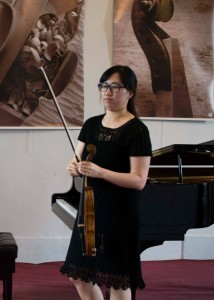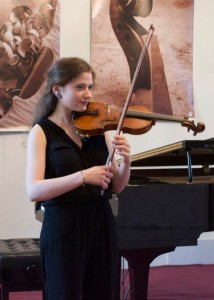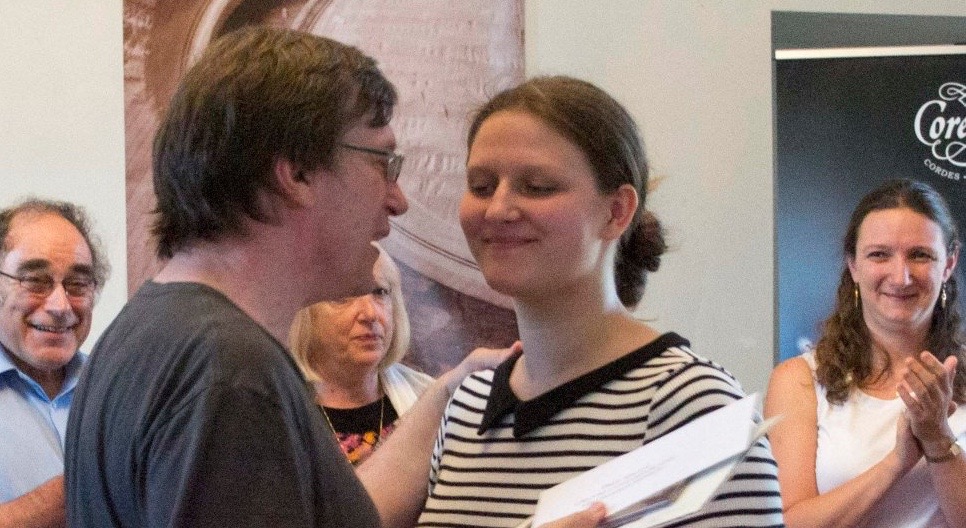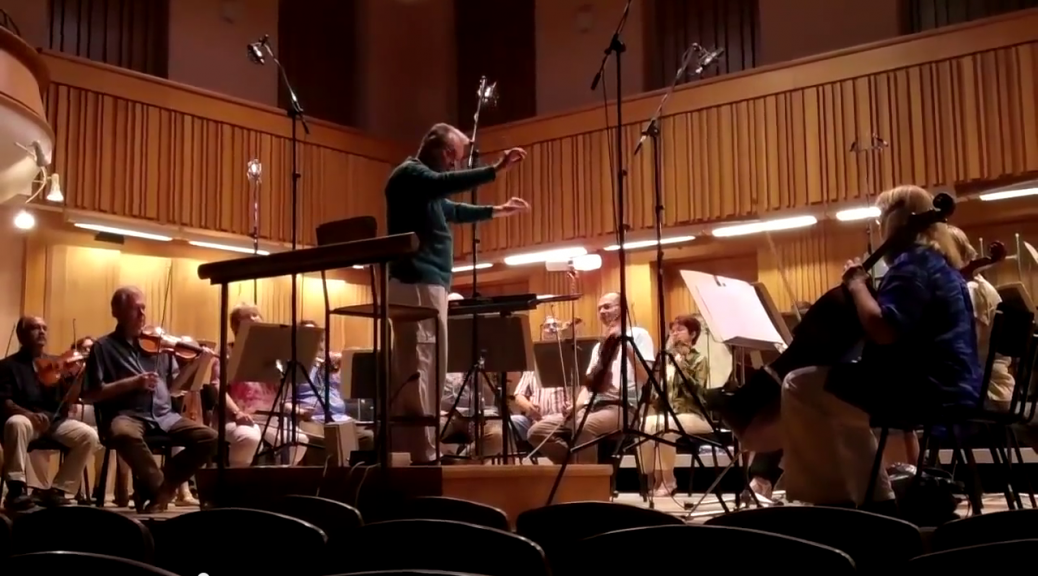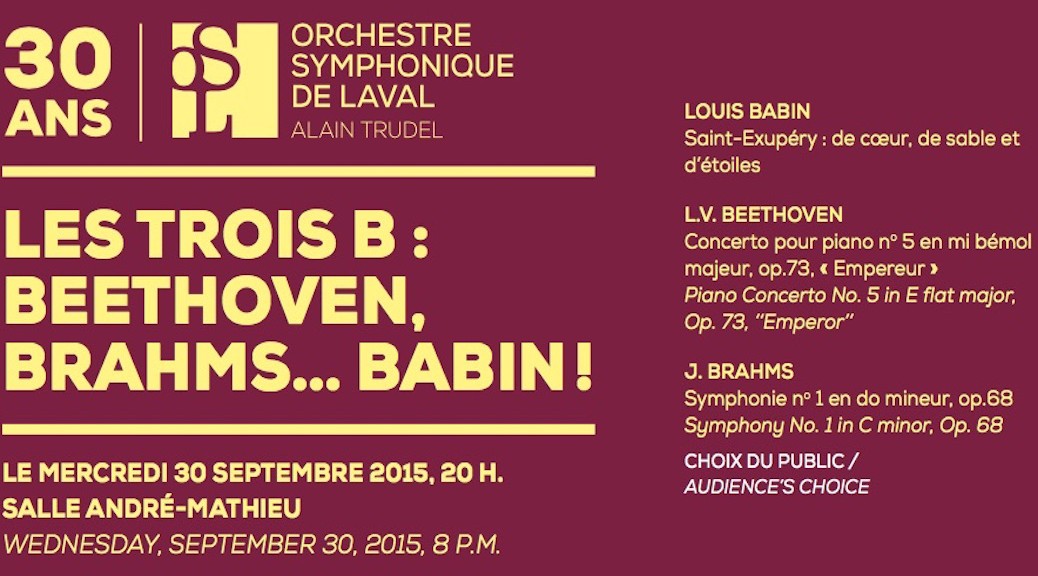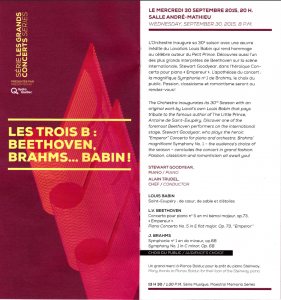Quelques critiques sur l’album
Saint-Exupéry : de cœur, de sable et d’étoiles
J’ai reproduit les articles dans l’ordre reçu. J’ai ajouté les liens permettant de les lire sur leurs pages d’origine. Comme ces pages peuvent parfois disparaître, je les reproduis ici intégralement afin de les conserver.

Éric Champagne, La Scena Musicale, Canada
Richard Haskell, the WholeNote, Canada (en anglais)
Raul da Gamma, JazzdaGamma, Canada (en anglais)
Marçal Borotau, Sonograma Magazine, Espagne (en espagnol)
Christophe Rodriguez, Journal de Montréal, Canada
Grego Applegate Edwards, Gapplegate Classical-Modern Music Review, États-Unis (en anglais)
New Classics, Royaume-Uni (en anglais)
Babysue.com, États-Unis (en anglais)

Éric Champagne, La Scena Musicale, septembre 2015 Vol. 21-1, Canada
« Jolie découverte que ce poème symphonique de Louis Babin inspiré par la vie et l’œuvre de Saint- Exupéry. À l’esthétique fortement ancrée dans la musique de film orchestrale contemporaine, la partition de Babin regorge d’inventivité et de couleurs qui charment dès la première écoute. Il est impératif de consulter les documents en ligne (lien inscrit dans la pochette) pour explorer à fond cette partition à l’imaginaire tendre et humain et en découvrir le processus créateur sous-jacent. De plus, ce projet est jumelé à une bonne cause puisque pour chaque disque vendu, un montant sera versé à la Fondation Antoine de Saint-Exupéry pour l’éducation des jeunes en difficulté. En complément de ce triptyque symphonique, le disque propose deux autres œuvres: une courte pièce intitulée Couleurs qui démontre l’écriture adroite du compositeur et la Suite du promeneur, peut-être son œuvre la plus jouée en concert, qui reflète avec philosophie la vision du monde de son auteur. Une belle carte de visite que ce disque au sujet duquel nous n’avons qu’un seul regret: il est trop court! »
Retour en haut

Richard Haskell, the WholeNote, 1er septembre 2015, Canada
“Antoine de Saint-Exupéry is perhaps best remembered today as the creator of the famous children’s book Le Petit Prince. Yet he was not only an acclaimed French author of several important works and laureate of high French literary awards, but also a French Air Force pilot who lost his life during a reconnaissance mission in 1944. What a noble character to honour in music, and that’s exactly what Québec-born composer Louis Babin has undertaken here. The CD opens with Saint Exupéry: de coeur, de sable et d’étoiles, a three-movement work named for Saint Exupéry’s novel from 1939. The music pays homage not only to the author but to his whole life. Vol de vie, the first movement, is suitably bold and heroic, featuring an appealing array of tonal colours treated by the Moravian Philharmonic with great panache. The second movement, Les adieux au Petit Prince is moody and mysterious, making effective use of percussion, while La marche des Hommes with its stirring brass sections, is pure cinematography.
“Couleurs for string orchestra is a poignant reflection on the trials of adolescence while the Suite du promeneur is a musical depiction of life’s passage on earth. Also scored for strings, the suite comprises four miniature movements, each a study in contrasts, from the wistfulness of Le Curieux to the steadfast defiance of La morale de cette. Despite its French roots, this music seems to have a Scandinavian feel to it, the sprightly rhythms and angular lines akin to those of Dag Wirén or Carl Nielsen. The warm and resonant sound from the Moravian strings further enhances a solid performance.
“The premise behind this CD is an intriguing one and it’s resulted in some fine music by a composer we should be hearing more from – bravo to Babin and the musicians from Moravia.”
Retour en haut

Raul da Gamma, JazzdaGamma, 13 août 2015, Canada
“The grand manner is implicit in Petr Vronský’s opening of Saint-Exupéry. Cellos and basses are deep yet pianissimo, as specified; yet the first tutti reveals a large orchestra, powerful but dense in texture. Wind instruments tend to blend in and the horns, also important partners of the piano trio, shine equally in this capacity as they do in other modern orchestra performances. True, Babin may have marked down their dynamics, but Petr Vronský doesn’t always factor that in.
“The ‘briefly played soli’ by soloists, if you can call them that, a more closely placed and dramatically so, in the first movement as well as in the other two (in “Saint-Exupéry: De Cœur, De Sable et D’Étoiles”, that is), are individually and collectively very good. While none are credited here, it is clear that strings and brass are key and their unobtrusive virtuosity pays dividends especially in the vaunted traceries of the slow movements. “Les Adieux de Petit Prince” is profoundly beautiful and the final movement “La marche des hommes” is swift and peremptory but this is nevertheless an accomplished performance.
“So is that of “Couleurs” and “La Suite du promeneur”, recorded in a drier acoustic. Orchestral lines register more clearly and as in the case of the latter, especially, none of the strings are forward of the ensemble. Tastefully and artistically these are blended in as contrasting colours in a canvas often are in both pieces. The instrumentalists’ technique is unassailable and they are inside the heart of two emotionally knotty works.
“Flanking a brooding “Coleurs” (oboes and clarinets sumptuously laid out) are the Saint- Exupéry suite and “La Suite du promeneur”. It pays to reiterate that these are works of sombre potency, and all require an inhibited interpretative commitment that the instrumentalists – to a man and woman – are able and willing to give. They all stand forward, giving the music the full weight of insight – which Petr Vronský appears to endorse.
“These are richly adorned works by a startlingly original composer – Louis Babin. Their performances together with the recorded quality of the programme – the finest you can imagine – make a compelling case for this disc.”
Retour en haut

Marçal Borotau, Sonograma Magazine, 29 juillet 2015, Espagne
«Amb la col·laboració de la Fondation Antoine de Saint Exupéry, el segell americà Parma Recordings acaba de presentar una obra del compositor Louis Babin dedicada a l’escriptor francès Antoine de Saint-Exupéry.
I abans de comentar l’obra musical, us volem anunciar que amb la compra d’aquest disc contribuïm a facilitar les activitats de la Fondation Antoine de Saint Exupéry pour la Jeunesse, que treballa per l’educació dels joves amb dificultats a França i al món, per evitar l’exclusió i la marginació dels més febles. Un projecte, doncs, notori que impulsa els valors artístics i solidaris a l’entorn de la figura de l’escriptor francès.
« Louis Babin, violista, trompetista i compositor canadenc, treballa la composició des d’un punt de vista eclèctic – en estil de jazz, clàssic o contemporani- la qual cosa li ha facilitat entrar en el món del cinema i del teatre. La seva activitat es desenvolupa al continent americà i europeu; ha estat guardonat amb el World Music Competition IBLA Grand Prize, 2010 i va quedar finalista al concurs de composició del Centre de musique canadienne – Québecor, 2013.
« I ara, Babin uneix el seu nom a un escriptor, poeta i aviador francès que va conquerir el cor de moltes persones amb la seva obra “El petit príncep”.
Amb un inici espectacular en la veu d’una melancòlica trompeta, comença el primer moviment, Vol de vie. En el segon moviment, Les adieux au Petit Prince, el compositor dóna presència a uns sons sorprenents per recrear aquest imaginatiu vol en una exposició orquestral plena, amb corda, vent i percussió. Cal destacar els tocs de triangle que infonen delicadesa a la narració. En el tercer i últim moviment, La marche des Hommes, l’autor ens contagia el seu entusiasme amb un ritme repetitiu, una escala descendent, que contrapunteja, de nou, amb la trompeta, per acabar amb un missatge majestàtic de plenitud expressat amb brillantor per l’eficient Moravian Philharmonic Orchestra, sota la direcció d’un eloqüent Petr Vronkjý.
« L’àlbum també inclou dues obres més de Louis Babin. Couleurs amb una orquestració molt atractiva -una obra dedicada a l’adolescència- i La Suite du promeneur on l’autor, optimista, expressa la seva certesa sobre els amplis camins que ha obert la humanitat.
Un disc especialment elegant i ple de tendresa. »
Retour en haut

Christophe Rodriguez, Journal de Montréal, 27 juillet 2015, Canada
En voyage avec Saint-Exupéry
«Tout récemment, le politicologue, professeur et blogueur au Journal de Montréal Mathieu Bock-Côté faisait un appel à tous, soit les lectures qui ont marqué notre vie. Ayant toujours aimé l’aviation (un rêve de petit garçon), il y a l’incontournable Vol de nuit, et bien entendu, Le Petit Prince. Ce qui était un conte philosophique pour enfants (le mouton, la rose et le renard) est devenu au fil des décennies, un livre de chevet pour je ne combien d’adultes.
«Comme nous sommes en période estivale, pourquoi ne pas glisser ce précieux volume sous l’oreiller de votre marmaille, avec en plus, la musique du montréalais Louis Babin: Saint- Exupéry: De coeur, de sable et d’étoiles. Peu connu du grand public, celui qui fut altiste, trompettiste pendant fort longtemps est un compositeur très prisé de plusieurs formations montréalaises.
«En collaboration avec la fondation Antoine de Saint-Exupéry et le projet d’autofinancement Kickstarter, nous pouvons affirmer que Louis Babin a réussi son pari, aussi énorme soit-il. Étalée sur une période quatre ans, avec le Moravian Philarmomic Orchestra sous la direction de Petr Vronsky, l’âme de Saint-Exupéry se déploie au fil des neuf plages. Pour peu que vous soyez familier avec son œuvre littéraire, tout un chacun reconnaitra: Vol de Vie (ou de nuit), Les adieux du Petit Prince, la marche des hommes : un hommage certain au grand aviateur Henri Guillaumet dans la cordillère des Andes et ceux de l’aéropostale.
«Dans cet ensemble très cinématographique, les cuivres font sentir leur présence par de très beaux traits d’orchestres, tout comme la masse des cordes, vibrante et captive. Plus nous avançons dans l’écoute et plus, le sentiment de magie se propage. Dans La suite du promeneur, le « curieux », plage 5 passera de l’extase, plage 6 à la tentation, plage 7.
«Louis Babin connait son métier , ainsi que ceux ceux qui ont donné aux trames musicales du 7e art, leurs lettres de noblesse. Parfois, il « convoque » Korngold, Ennio Morricone et l’un des complices du trompettiste Miles Davis : Gil Evans. Saluons ce travail de longue haleine que vous pourrez entendre, mercredi 30 septembre 2015 avec l’Orchestre symphonique de Laval.»
Retour en haut

Grego Applegate Edwards, Gapplegate Classical-Modern Music Review, 21 juillet 2015, État-Unis
“Saint-Exupery was a French writer, poet and pioneering aviator. His novel masterpiece The Little Prince appeared in 1943 at the same time as he was serving as a pilot in the French Air Squadron in North Africa. He flew on a mission over Occupied France and never returned, presumed dead.
Saint-Exupery: De Coeur, De Sable et D’Etoiles and Other Works (Les Productions Louis Babin ODL-LB-002) is Canadian composer Louis Babin’s tribute to the life and work of Saint-Exupery. It features the centerpiece “Saint-Exupery: de coeuer, de sable et d’etoiles” along with “Couleurs” and “Le Suite du promeneur,” all orchestral works performed quite respectably by the Moravian Philharmonic under Petr Vronsky.
These are descriptively modern tonal pieces that cover some considerable terrain with a post-romantic sensibility and a varied palette of orchestral colors. There is much to appreciate, vivid music from a Canadian composer who is perhaps not as well known outside his home country as he deserves. Saint-Exupery gives us three exemplary works that serve as a good introduction to Louis Babin. Listen and enjoy.”
Retour en haut

New Classics, juillet 2015, Royaume-Uni
“French aristocrat, writer, poet, and pioneering aviator Antoine de Saint-Exupéry was born in 1900. He flew for the first time at the age of twelve, at the Ambérieu airfield and became determined to be a pilot. Later, after failing the entrance exams for the French naval academy, he enrolled at the prestigious art school l’Ecole des Beaux-Arts in Paris before serving in the military, where he learned to be a pilot. After leaving the service, he worked as a profession pilot and became a hugely successful novelist. His classic, The Little Prince, appeared in 1943, when Saint-Exupéry was serving with his French air squadron in northern Africa. Despite being forbidden to fly (he was still suffering physically from his earlier plane crashes), he insisted on being given a mission. On July 31, 1944, he set out from Borgo, Corsica, to overfly occupied France, and never returned. Canadian composer and former violist Louis Babin created his ambitious piece for symphony orchestra – Saint-Exupéry : de cœur, de sable et d’étoiles – as a moving homage to a literary icon who is commemorated in the Panthéon in Paris, France’s repository of historical greats, even tthough his body was never identified. The music is an exploration not just of the novel but of the author’s entire life, representing both the clarity of Saint-Exupery’s thinking and the tumultuous events he faced. Peter Vronsky conducts the excellent Moravian Philharmonic Orchestra. As well as this heartfelt tribute, the album also includes two more works by Louis Babin. Couleurs poignantly depicts the longing of adolescence, and La Suite du promeneur shares a philosophic vision of mankind’s passage here on earth. Highly recommended.”
Retour en haut

Babysue.com, juillet 2015, États-Unis
“We haven’t heard many independently-released classical albums. Saint-Exupery: De Coeur, de Sable et d’Etoiles is an adventurous undertaking to say the least. On the lead composition Canadian composer Louis Babin presents music that “is an exploration not just of the novel but of the author’s entire life, representing both the clarity of Saint-Exupery’s thinking and the tumultuous events he faced.” For those who are not familiar with the man, Saint-Exupery was a French national hero and as well as the author of the children’s novel The Little Prince. Under conductor Peter Vronsky, the Moravian Philharmonic Orchestra masterfully presents three moving sections that will undoubtedly please discerning music fans. Beautiful stuff that sounds very much like the soundtrack to a truly moving art film. In addition to the title track, the album also contains the intensely emotional “Couleurs” and “La Suite du Promeneur,” which is presented in five short sections. Louis Babin certainly is a composer to be reckoned with now and in the years ahead. Amazing material that is riveting, pure, and completely beautiful. Recommended. Top pick.”
Retour en haut
 thewholenote
thewholenote

